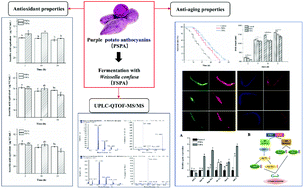Anti-aging effects of the fermented anthocyanin extracts of purple sweet potato on Caenorhabditis elegans
Abstract
Anthocyanins have anti-inflammatory, anticarcinogenic and antioxidant properties and anti-aging effects as well as potential application as pigments. The metabolism of anthocyanins in fermented food has attracted increasing attention. However, the effect of lactic acid bacteria (LAB) fermentation on its anti-aging activity remains mostly unknown. The current study aimed to investigate the compositions, antioxidant activities and anti-aging effect of fermented purple sweet potato anthocyanins (FSPA) on aging Caenorhabditis elegans compared to raw purple sweet potato anthocyanins (PSPA). Results showed that anthocyanins were degraded into more bioavailable phenolic acids by Weissella confusa fermentation. PSPA and FSPA can extend the lifespan of C. elegans by 26.7% and 37.5%, respectively, through improving the activity of antioxidant enzymes as well as decreasing MDA content, ROS levels and lipofuscin accumulation. Pretreatment of the worms with PSPA and FSPA induced their potential to resist to thermal tolerance and oxidative stress, and FSPA exerted a higher anti-stress effect than PSPA. Moreover, FSPA supplementation upregulated the mRNA expressions of genes daf-16, hsp-16.2, sir-2.1, skn-1 and sod-3 and downregulated the expression of daf-2 in the nematodes, whereas PSPA only induced the increase in the expressions of sir-2.1, skn-1 and sod-3. Overall, FSPA can improve stress resistance and extend the lifespan of C. elegans by both insulin/IGF-1 signaling pathway and dietary restriction pathway, providing a theoretical basis for the application of PSPA in fermented food as functional pigments.



 Please wait while we load your content...
Please wait while we load your content...